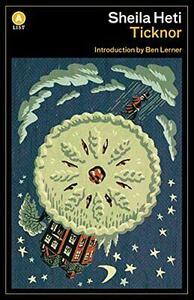Take a photo of a barcode or cover
challenging
emotional
reflective
tense
slow-paced
Plot or Character Driven:
Character
Strong character development:
N/A
Loveable characters:
N/A
Diverse cast of characters:
N/A
Flaws of characters a main focus:
N/A
I don’t know why I enjoyed this book but I did. It’s short but extremely dense. Commas everywhere. Heti’s style is very unique and phonological. She dabbles with second person but it’s not directed at the reader, rather it’s Ticknor talking to himself. It’s tight and tense. Ticknor’s self-consciousness and rambling monologues are really good at pulling you into his mind. This is a book about voice more than anything else, and it’s really well done. I will think of Ticknor every time I miss a streetcar.
Some passages I loved:
It will take me a while to get there. You will get there soon enough. Getting somewhere always involves more effort than the effort of getting there is worth. Of course, there is nothing to be done about it. p5
I’m sorry I’m late. So sorry I’m late. You know how long these winding roads take. So sorry I’m late. Has everything already started? p6
I am very adept at talking to one person. p34
My manner of life is, like everyone’s, patchwork. p64
Some passages I loved:
It will take me a while to get there. You will get there soon enough. Getting somewhere always involves more effort than the effort of getting there is worth. Of course, there is nothing to be done about it. p5
I’m sorry I’m late. So sorry I’m late. You know how long these winding roads take. So sorry I’m late. Has everything already started? p6
I am very adept at talking to one person. p34
My manner of life is, like everyone’s, patchwork. p64
poor old George Ticknor. he must have had a lonely life, a life he had wanted to be different to what it was. the opening pages of the book set him up as the ultimate unreliable narrator, in a kind of spirographic whorl of contradictions woven into a dense mandala of neurodivergent monologue.
the book does open up much more so than other "recursive" novels i have read lately - Lispector, Fosse, Amy Arnold, Cusk to a lesser degree - but that initial flurry serves as the basis for what follows; the toe is dipped into those swirling waters a few more times.
i very good book, very pleasurable to read; it starts by winding the tension like winding a clock, and the rest of the book is the steady unspooling of that tension, not towards any true release, but until time runs down.
the book does open up much more so than other "recursive" novels i have read lately - Lispector, Fosse, Amy Arnold, Cusk to a lesser degree - but that initial flurry serves as the basis for what follows; the toe is dipped into those swirling waters a few more times.
i very good book, very pleasurable to read; it starts by winding the tension like winding a clock, and the rest of the book is the steady unspooling of that tension, not towards any true release, but until time runs down.
reflective
medium-paced
challenging
reflective
tense
medium-paced
Plot or Character Driven:
Character
Strong character development:
No
Loveable characters:
Complicated
Diverse cast of characters:
No
Flaws of characters a main focus:
Yes
challenging
emotional
reflective
slow-paced
Plot or Character Driven:
Character
Strong character development:
Complicated
Loveable characters:
Yes
Diverse cast of characters:
No
Flaws of characters a main focus:
Yes
dark
reflective
slow-paced
Plot or Character Driven:
N/A
Strong character development:
N/A
Loveable characters:
N/A
Diverse cast of characters:
No
Flaws of characters a main focus:
Yes
This book follows the real person George Ticknor, heading out to his friend and (real) american historian William Prescott’s party in Boston in the early 1900s, and is completely in Ticknor’s head. If you have social anxiety, this book might feel too close to home as he wonders whether Precott even likes him, if he’s being invited out of pity, if his pie will be welcome, if he will know anybody, if we will make a favourable impression or be an awkward loner, if his suit will smell from the rain, if the pie will be accepted only out of pity, if he will be *too* late for the party (if only he’d left earlier!) or maybe he shouldn’t have left at all, is it too late to go home, he probably won’t really be missed…. (iykyk).
Amongst those thoughts is Ticknor reflecting on his friendship with Prescott, and the jealousy he has for Prescott’s success. Ticknor feels like a failure, and reflects on all the what-ifs that could have made him successful, even blaming Prescott’s success on societal pity of his visual impairment. It is a fascinating read because Ticknor is so unreliable. I couldn’t parse out whether his relationship with Prescott is toxic, and Prescott himself has curated Ticknor’s social unease and personal lack of faith, or whether Ticknor is just shy and lacks confidence. I couldn’t tell whether Ticknor was at all successful or a complete failure, whether he was truly awkward and unlikable or just thought he was. Of course, with all things in our own heads, do we ever really understand objective reality and our place in it (without therapy)?
This is a slow, painfully introspective book. Heti was particularly interesting as she pulled from real sources, including Florence Nightingale, throughout her book to inform the relationship between Ticknor and Prescott and their histories together. For a first introduction, I really enjoyed this book (beyond the constant cringing from secondhand anxiety) and am really excited to read more from her.
reflective
slow-paced
A very pleasant surprise. This book is like a really strange museum. You can read it in one sitting and you should.
You have to be in the right mood for this one, that's for sure. When I first started it, was in the wrong mood, and couldn't manage more than a few pages of Heti's gauntlet-throwing variable second-person subjects (sometimes "you" for the narrator himself, talking to himself, sometimes "you" for the narrator speaking in his mind to the not-present subject of his obsession, Prescott).
Anyway, took it up again, started from beginning, was in the right mood somehow, and loved it. Loved. Ticknor is the worst in all of us, Prescott the kind of person you want to be, love, and tend to hate all at the same time.
Anyway, took it up again, started from beginning, was in the right mood somehow, and loved it. Loved. Ticknor is the worst in all of us, Prescott the kind of person you want to be, love, and tend to hate all at the same time.





